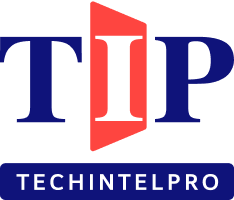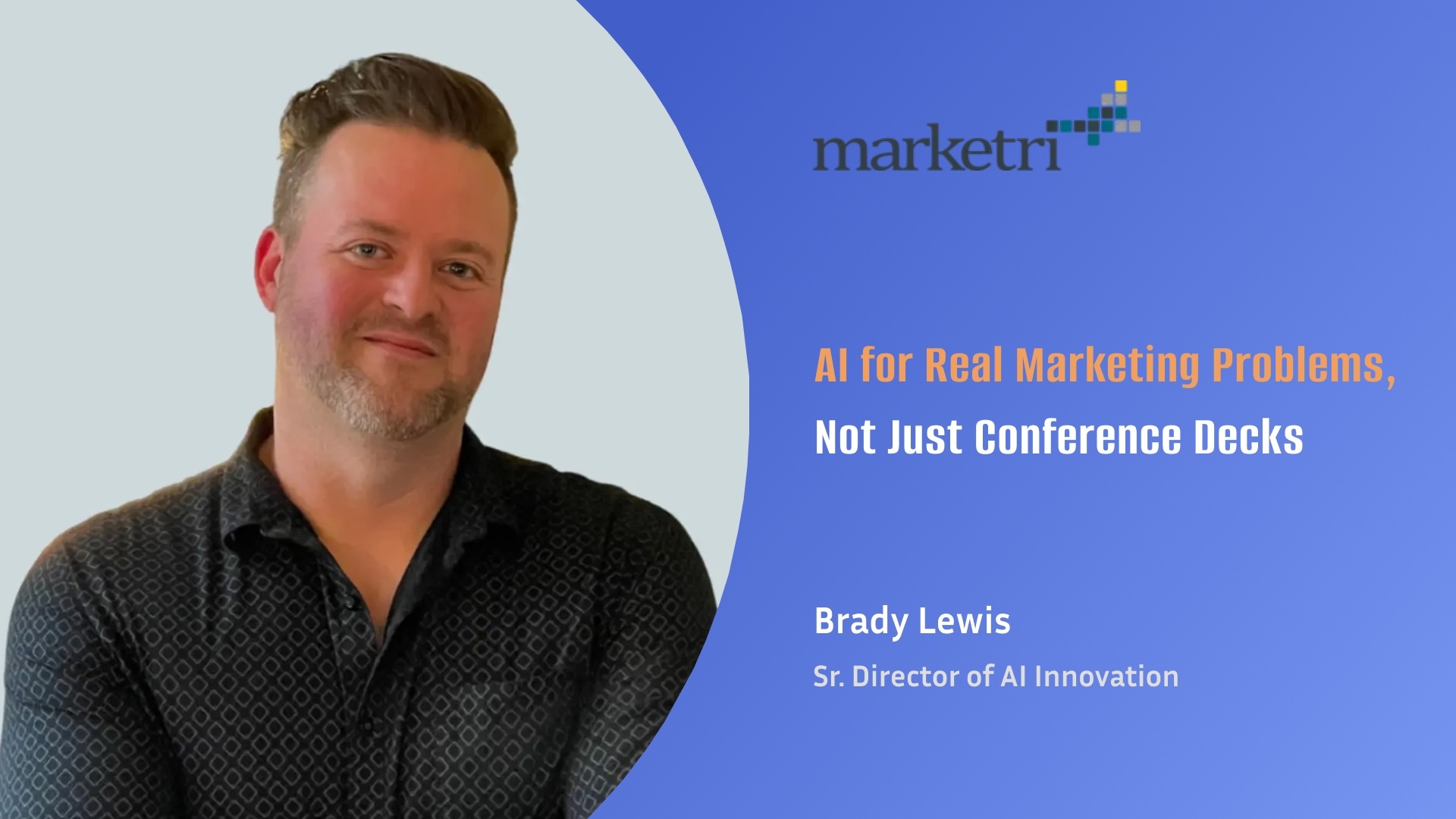

What happens when AI stops being hype and starts solving?
Brady Lewis, Sr. Director of AI Innovation at Marketri, unpacks how Marketri uses AI to tackle real marketing problems, cut through complexity, and deliver measurable results for B2B firms through its fractional model.
The thread is solving the same fundamental problem in different ways: closing the gap between what technology can do and what businesses actually need it to do. Whether I'm building an AI platform, implementing enterprise solutions, or writing about AI for everyday people, it all comes down to translation.
At Marketri, that translation happens every day. We work with professional services firms who are brilliant at their core business but often struggle with marketing technology. They know they need AI to stay competitive, but they don't need to become data scientists to use it effectively. My role is making sure our AI innovations actually solve real marketing problems for real businesses, not just impress people with technical capabilities.
The beauty of working at a fractional marketing firm is that we see the same challenges across dozens of different companies. That gives us incredible insight into what actually works versus what just sounds good in a conference presentation. Every AI solution we build gets tested in the real world with real clients who have real budgets and real expectations.
We've learned that AI maturity isn't really about company size or industry. It's about three things: data readiness, team capacity, and leadership buy-in. A small accounting firm with clean client data and an eager marketing manager can often move faster with AI than a large law firm with scattered information and skeptical partners.
Our approach starts with what we call an "AI readiness assessment." Not the technical kind where we analyze their database architecture, but a practical one. Can they consistently collect client information? Do they have someone who can spend time learning new tools? Are the decision-makers genuinely interested in improving their marketing, or are they just checking the AI box?
For organizations that are AI-curious but not AI-ready, we start with basic automation and content assistance. Think email templates that sound like them, or social media posts that reflect their expertise. For companies that are more mature, we can implement sophisticated client journey mapping and predictive analytics. The key is meeting them where they are, not where we think they should be.
Mid-sized B2B companies have hit the sweet spot where they have enough data to make AI useful but aren't drowning in the complexity that bogs down large enterprises. They typically have 5-10 years of client relationships, established processes, and real business problems that AI can solve without requiring a complete organizational overhaul.
Startups often lack the historical data that makes AI truly powerful, and they're usually too busy trying to find product-market fit to focus on marketing optimization. Large enterprises have the opposite problem: they have so much data and so many stakeholders that implementing AI becomes a two-year committee project.
Mid-sized companies can make decisions and implement solutions quickly. When we show them how AI can help identify their best potential clients or automate their thought leadership content, they can test it, refine it, and scale it within months, not quarters. They also have enough marketing budget to invest in AI tools, but aren't so large that they need enterprise-level solutions with enterprise-level price tags.
Most B2B companies get sold AI solutions that sound impressive but don't integrate with how they actually work. I've seen accounting firms buy sophisticated marketing automation platforms that require a full-time administrator, or consulting companies invest in AI analytics tools that produce reports nobody knows how to interpret.
My technical background lets me evaluate what's realistic for a company's current setup and what's just vendor marketing. When a client says they want "better lead scoring," I can immediately assess whether their CRM can support that, what data they'd need to collect, and how long implementation would actually take. More importantly, I can explain the technical requirements in business terms that they can understand and budget for.
The marketing side ensures that whatever technology we implement moves the needle on business development. I've seen too many technically perfect solutions that don't generate a single additional client. My job is making sure every AI tool earns its keep by either saving time, improving results, or both.
The biggest concern isn't what you'd expect. It's not privacy or job displacement. It's the fear that AI will make their marketing feel generic or robotic. B2B service providers built their reputation on personal relationships and professional expertise. They're terrified that AI will turn them into another generic service provider.
I address this by showing them our brand voice replication work. We can take their existing content, analyze their communication style, and train AI systems to create new content that sounds authentically like them. When a partner at a CPA firm sees AI generate a tax strategy article that captures their specific expertise and communication style, the lightbulb goes on.
The second concern is cost and complexity. They've been burned by expensive marketing technology that promised the world and delivered spreadsheets they don't understand. We counter this with small, measurable pilots. Start with AI-assisted content creation for three months. Measure time saved and engagement improved. Then expand based on results, not promises.
AI is already rewriting content creation, audience segmentation, and performance optimization. Within two years, manually writing individual blog posts or social media updates will feel as outdated as manually updating website HTML. AI will handle the research, create multiple variations, and optimize based on performance data faster and more accurately than humans ever could.
But relationship building, strategic positioning, and creative direction will remain fundamentally human. AI can analyze data patterns, but without human expertise, it can't understand why a particular message will resonate with a specific professional community. It can optimize email subject lines, but it can't craft a compelling brand narrative that differentiates a company in a crowded market.
The future of B2B marketing is AI handling the execution while humans focus on strategy, creativity, and genuine relationship building. Smart firms will use AI to eliminate the time-consuming tactical work so their people can spend more time on the high-value activities that win clients.
The fractional model is becoming the standard, not the exception. Companies across industries are recognizing that fractional leadership gives them access to senior-level expertise without the commitment and cost of full-time executives, with fractional CMO adoption rising over 60% in the last five years.
Our long game is positioning Marketri as the AI-powered fractional marketing firm. While other fractional companies are still manually creating strategies and content, we're using AI to amplify our consultants' capabilities. This lets us deliver senior-level strategic thinking with the efficiency of automated execution.
The real competitive advantage is that our AI tools learn from every client engagement. When we solve a positioning challenge for one professional services firm, that knowledge gets incorporated into our systems to help the next client. We're building what I call "collective intelligence," where every engagement makes us smarter for future clients. That's something traditional agencies and solo consultants can't match, and it's exactly the kind of strategic value that will define the next generation of fractional marketing services.
Brady Lewis is the Senior Director of AI Innovation at Marketri, with over 20 years of experience as a technology-focused entrepreneur and enterprise consultant. Having spent 7+ years leading complex implementations for Fortune 500 companies across retail, finance, and education sectors, Brady brings a rare combination of hands-on technical architecture and strategic marketing insight to his role at Marketri.
Marketri is the strategic growth partner for growth-focused mid-sized B2B companies. We combine deep industry expertise, advanced AI, and proven marketing solutions to turn complexity into clarity and drive measurable results. With over 20 years of experience, Marketri transforms marketing into a dynamic engine for growth, empowering businesses to scale smarter, adapt faster, and lead with confidence.
Learn more at marketri.com